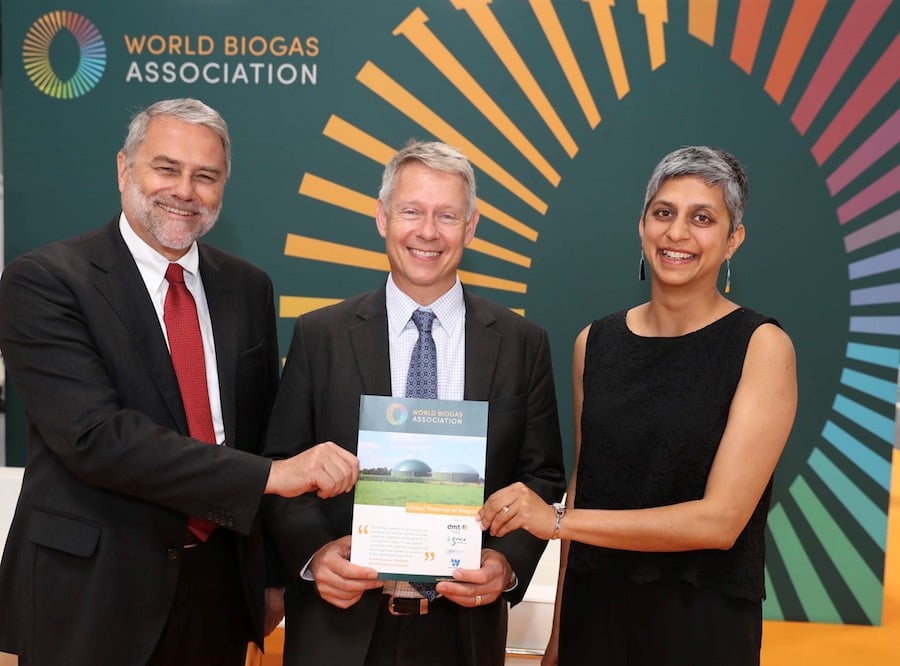
WBA calls for decisive policies to fulfill global decarbonisation potential of biogas
- Biogas industry could reduce global GHG emissions by circa 12% and help governments meet their climate change commitments
- It needs the political and financial will to fulfil this potential
- The technology is mature and supports the development of a circular economy across multiple sectors
Following on from the recent publication of its Global Potential of Biogas report, which demonstrates that biogas could rapidly reduce world GHG emissions by a massive 12%, the World Biogas Association (WBA) has issued recommendations to world governments, financial institutions and other key decision-makers to support the industry becoming a key player in meeting Paris Agreement commitments and developing a low carbon circular economy.
At the heart of WBA’s call is the need to move away from fossil fuel and invest in the infrastructure and incentives required to build a powerful anaerobic digestion and biogas industry that will provide not only a stable and flexible source of clean energy, but also bio-fertilisers for agriculture and a potent waste management and sanitation solution. WBA in fact adheres to the call issued by the United Nations Environment Programme to measure and eliminate fossil fuels subsidies. These are currently about 3 to 4 times the direct subsidies given to renewable energy.
WBA President David Newman says: “We will not meet Climate Change targets unless there is a level playing field put in place to support low carbon alternatives to fossil fuels for energy generation, such as biogas. Our industry, in particular, offers greater benefits towards the development of a sustainable circular economy, turning harmful organic wastes into green electricity, gas and transport fuel, and also into a zero-carbon fertilizer that restores the soil and boosts crop yields; it brings economic growth through employment and cost-savings and promotes health and well-being through better living conditions. The technology is mature, but we are currently processing only 2% of the feedstock available globally. All we need to unleash this huge potential is the political and financial will to build the policy, regulatory and operational infrastructure that we need, but time is running out.”
The key recommendations focus around:
- National pledges to reduce GHG emissions, including the removal of fossil fuel subsidies, through their Paris Agreement Nationally Determined Commitments, energy plans, net-zero targets by 2050 and increases in renewable energy production and consumption over the next decade.
- The inclusion of AD into these pledges and at the core of circular economy strategies, with targets set for the production of biogas, AD included in all incentive policies and AD nominated as the preferred method of treatment for all biodegradable wastes
- Policies to increase biodegradable wastes capture, including the provision by local governments of separate food waste collections in both urban centers and rural areas, and mandatory food waste collection and treatment for businesses of a certain size, combined with increased AD capacity to process the new waste stream.
- The development of a robust infrastructure to enable the collection and processing of feedstock in large communities as well as remote rural areas, its treatment through both large and small scale facilities, and distribution through a network of refueling points for biomethane as a transport fuel and injection points for gas going into the grid.
- The management of digestate and implementation of regulations and standards for its safe trading and use.
- Measures to ensure land is managed with due diligence to environmental impact and energy crops are integrated into production in the most sustainable way.
Read the full list of recommendations.
The WBA’s recommendations were echoed by the head of Global Climate Action, UN Climate Change (UNFCCC Secretariat), Niclas Svenningsen, in a keynote speech at the World Biogas Summit on 3rd July in Birmingham.
“There is a tremendous potential for biogas to be a significant building block in the climate and energy plans for the UK, EU and the world,” he said. “With the right incentives, the right policies and the right support, biogas can and will offer key opportunities for many countries to help implement the Paris Agreement, and address several of their Sustainable Development Goals. It needs to be at the table when the future policies of governments are designed.”
The Global Potential of Biogas report also lists examples of policies and schemes implemented around the world which have already made a significant difference for those countries.
– ENDS –
For further information, contact:
Jocelyne Bia, Senior Communications Consultant, World Biogas Association
e: jbia@worldbiogasassociation.org; t: +44 (0)7910 878510
Notes to editors:
- Launched at COP22 in Marrakesh in 2016, the World Biogas Association is the global trade association for the biogas, landfill gas and anaerobic digestion (AD) sectors, dedicated to facilitating the adoption of biogas globally. It believes that AD and biogas technologies provide multi-faceted opportunities to produce clean, renewable energy while resolving global issues related to development, public health and economic growth. www.worldbiogasassociation.org @wbatweets
- The Global Potential of Biogas report demonstrates the potential of AD as a technology to generate renewable energy, abate GHG emissions and recover organic nutrients and carbon for use on soil. The report also sets out the potential of AD to help meet the climate change targets under the Paris Agreement.
- photo caption: Niclas Svennigsen, of UN Climate Change (centre), is presented with the Globas Potential of Biogas report by WBA President David Newman and author Dr Sarika Jain at the World Biogas Summit in Birmingham on 3rd July 2019.

